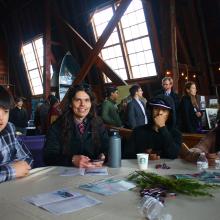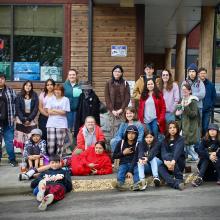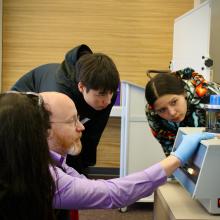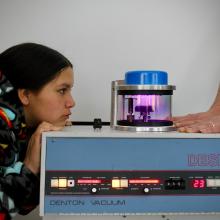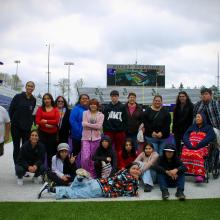by Sarah Culpepper Stroup
From April 20th to 22nd, a group of eleven excited 8th graders from Nespelem School on the Colville Reservation work up early, boarded a school bus, and crossed the state to spend three days exploring the UW, meeting Indigenous students and faculty, and even joining a field trip with Humanities First undergraduates.
After arriving on Thursday afternoon and checking into the Watertown Hotel just off campus, the group bused up to Sarah Stroup’s house for a large group dinner. The next morning the group met three of the UW’s students who are athletes (Madi Huskey, softball; SilentRain Espinoza, softball; Emoni Bush, volleyball), got a private tour of the sports facilities—including a trip to Husky Stadium during a football practice—and were treated to refreshments at the Conibear Shellhouse, where the kids got to hear about the athletes’ pathways to the UW. After this, the group attended, at the invitation of the department of American Indian Studies, the Willapa Spirit canoe awakening at the ASUW Shellhouse. The day continued with an afternoon visit to MolES labs, where NanoES/MolES Faculty and staff demonstrated how scientists learn from nature and how to build materials using atoms and molecules. On Saturday the group joined together with twelve Humanities First students on a field trip down to the Duwamish Longhouse and Cultural Center and the həʔapus Village Park & Shoreline Habitat archaeological site. After this, both groups headed down to Kubota Garden in the Rainier Beach neighborhood where they enjoyed the gardens, the koi, and a shared picnic lunch before the Nespelem students boarded their bus, waved goodbyes, and crossed the mountains once again.
This is the fourth trip to the UW by student groups from Colville. These life-changing trips are organized by Professor Stroup in consultation with her close friend in Colville, 8th grade teacher Barb Quintasket. All expenses for this visit were fully covered thanks to the extreme generosity of the Department of Classics and the National Nanotechnology Coordinated Infrastructure grant (funded by the NSF; Prof. Daniel Ratner, Co-PI).
